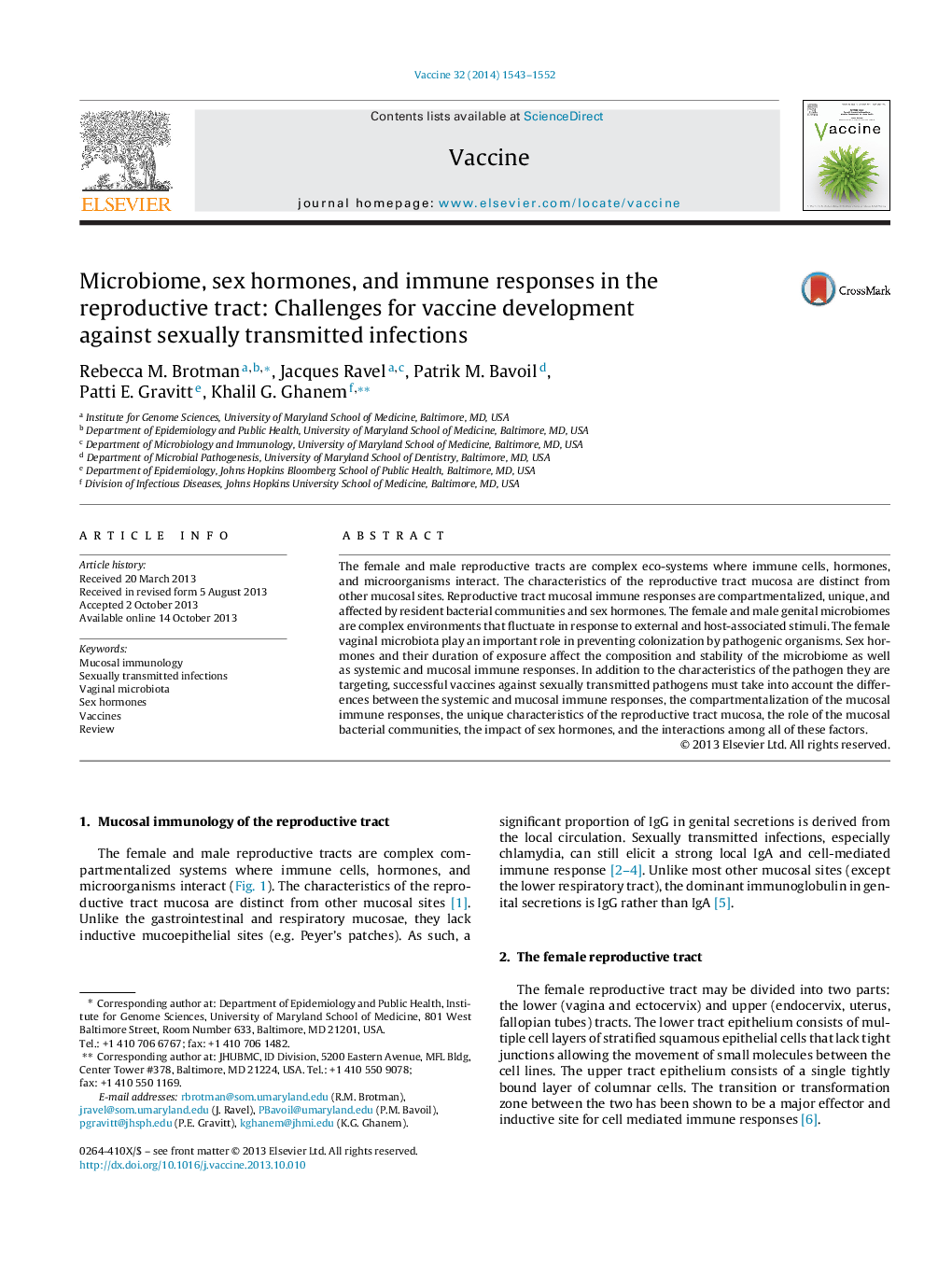| کد مقاله | کد نشریه | سال انتشار | مقاله انگلیسی | نسخه تمام متن |
|---|---|---|---|---|
| 10965237 | 1102740 | 2014 | 10 صفحه PDF | دانلود رایگان |
عنوان انگلیسی مقاله ISI
Microbiome, sex hormones, and immune responses in the reproductive tract: Challenges for vaccine development against sexually transmitted infections
ترجمه فارسی عنوان
میکروبیوم، هورمون های جنسی و پاسخ های ایمنی در دستگاه تولید مثل: چالش های توسعه واکسن علیه عفونت های منتقله جنسی
دانلود مقاله + سفارش ترجمه
دانلود مقاله ISI انگلیسی
رایگان برای ایرانیان
کلمات کلیدی
ایمونولوژی مخاطی، عفونت های منتقله از راه جنسی، میکروبیا واژینال، هورمون های جنسی، واکسن مرور،
ترجمه چکیده
گیاهان تولید مثل زن و مرد، محیط زیست پیچیده ای هستند که سلول های ایمنی، هورمون ها و میکروارگانیسم ها در تعامل هستند. خصوصیات مخاطی دستگاه تناسلی مولد از محل های مخاطی دیگر متفاوت است. واکنش ایمنی مخاطی مجرای تولید مثل تقسیم بندی شده، منحصر به فرد و تحت تاثیر جوامع باکتری ساکن و هورمون های جنسی است. میکروبیوم های تناسلی زن و مرد محیطی پیچیده هستند که در پاسخ به محرک های خارجی و میزبان انحراف دارند. میکروبیوتایپ واژن زن نقش مهمی در جلوگیری از استعمار توسط موجودات بیماریزا دارد. هورمون های جنسی و طول مدت مواجهه آنها بر ترکیب و ثبات میکروبیوم و نیز پاسخ ایمنی سیستمیک و مخاطی اثر می گذارد. علاوه بر ویژگی های پاتوژن مورد هدف قرار دادن، واکسن های موفق در برابر بیماری های منتقله از راه جنسی باید بین تفاوت های سیستم ایمنی و پاسخ های ایمنی مخاطی، تفکیک واکنش های ایمنی مخاطی، ویژگی های منحصر به فرد مخاط مخاطی دستگاه تناسلی، نقش جوامع باکتری مخاطی، تاثیر هورمون های جنسی و تعامل در میان تمام این عوامل.
موضوعات مرتبط
علوم زیستی و بیوفناوری
ایمنی شناسی و میکروب شناسی
ایمونولوژی
چکیده انگلیسی
The female and male reproductive tracts are complex eco-systems where immune cells, hormones, and microorganisms interact. The characteristics of the reproductive tract mucosa are distinct from other mucosal sites. Reproductive tract mucosal immune responses are compartmentalized, unique, and affected by resident bacterial communities and sex hormones. The female and male genital microbiomes are complex environments that fluctuate in response to external and host-associated stimuli. The female vaginal microbiota play an important role in preventing colonization by pathogenic organisms. Sex hormones and their duration of exposure affect the composition and stability of the microbiome as well as systemic and mucosal immune responses. In addition to the characteristics of the pathogen they are targeting, successful vaccines against sexually transmitted pathogens must take into account the differences between the systemic and mucosal immune responses, the compartmentalization of the mucosal immune responses, the unique characteristics of the reproductive tract mucosa, the role of the mucosal bacterial communities, the impact of sex hormones, and the interactions among all of these factors.
ناشر
Database: Elsevier - ScienceDirect (ساینس دایرکت)
Journal: Vaccine - Volume 32, Issue 14, 20 March 2014, Pages 1543-1552
Journal: Vaccine - Volume 32, Issue 14, 20 March 2014, Pages 1543-1552
نویسندگان
Rebecca M. Brotman, Jacques Ravel, Patrik M. Bavoil, Patti E. Gravitt, Khalil G. Ghanem,
